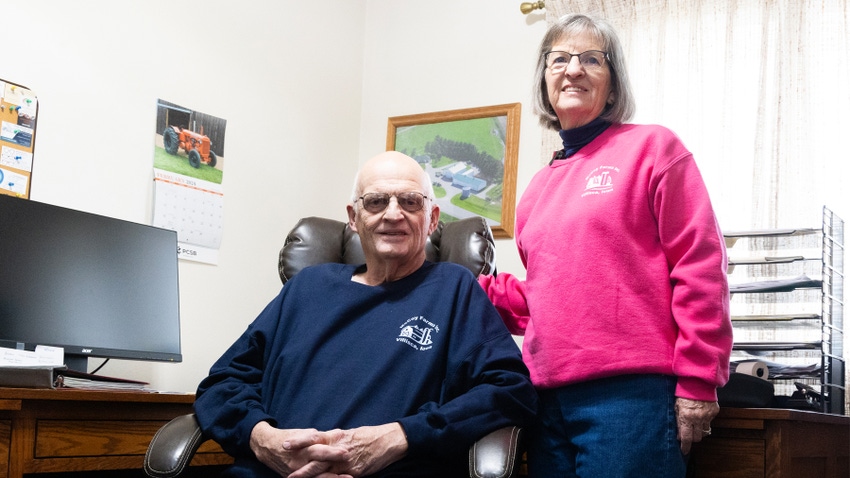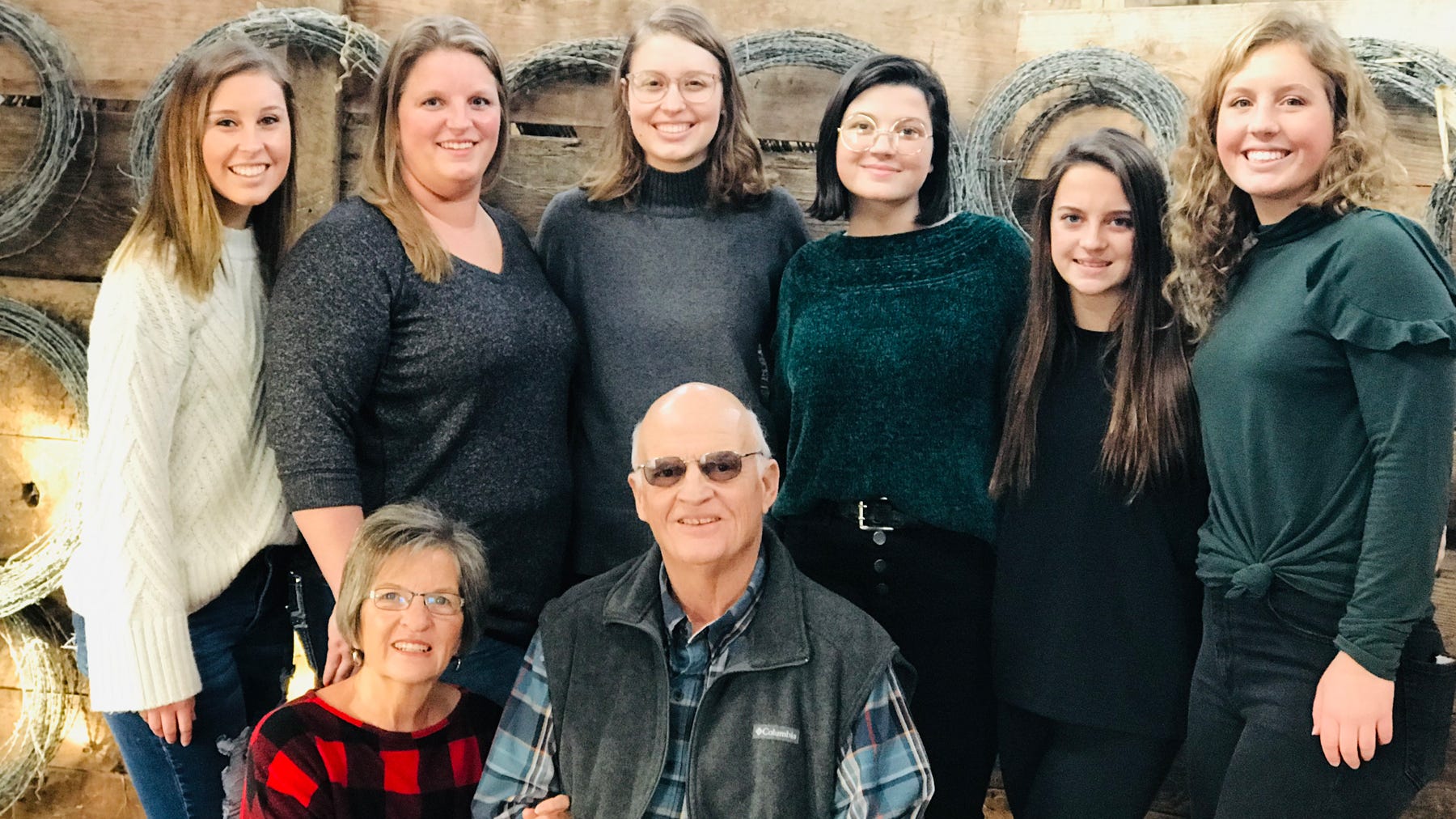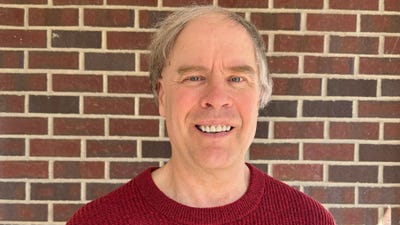
At a Glance
- Minor details, such as controlling invasive trees, add up to the well-managed farm of Neil and Becky McCoy.
- Constant attention during farrowing and calving that curtails pig and calf losses helps their bottom.
Neil and Becky McCoy exhibit teamwork akin to an all-star baseball pitcher and catcher. Rather than whiffing batters, though, they strike out weeds and invasive trees.
Each summer, the Villisca farmers load their all-terrain vehicle with a sprayer and head to their fields and pastures.
“We take turns spraying weeds from one side or the other,” Becky says. “I jump off the Gator to cut off the evergreens and honey locusts. It’s especially important to go around the terraces and cut them [trees] off before they get big.”
Just as “small ball” defines winning baseball teams that string together singles rather than home runs, efficient farms often piece together small factors that add up over time. For the McCoys, attention to detail leads to well-manicured and productive corn and soybean fields.
“As you drive through the neighborhood, it is easy to identify the land that is the McCoys’ farm,” says K. Kirk Jamison, one of the McCoys’ landlords.
This small ball approach also spills into the farm’s businesses, says Scott Henrichsen, a farm manager with Hertz Farm Management. “They perform the details of each job with the highest quality possible,” he says.
It’s this attention to detail — combined with community leadership — that has led to the McCoys being 2024 Iowa Master Farmers.
It all started with 4-H
It was 4-H that brought Neil and Becky together. Becky’s parents were 4-H leaders, as was Neil’s father. Growing up, the couple participated in their respective clubs.
“In those days, if you showed livestock, you belonged to a boys’ club,” Becky says. “If you did home ec [economics] projects, you belonged to a girls’ club. I showed steers and had home ec projects, so I was in two different clubs and attended two different meetings.”
Becky recalls the camaraderie and friendships that 4-H created. “We all worked together, getting our cattle ready to show,” she says. “We got together for family picnics. The girls would have slumber parties and be assigned as to who was in charge of breakfast, lunch and cleanup. It taught everyone to work together.”
Neil showed dairy cattle as a 4-H’er. The couple met during 4-H activities at the Page County Fair, just as Becky’s parents did.
“We dated for three years, and we’ve been married for 55. So yes, after 58 years, he’s a keeper,” Becky jests.
Starting out
The McCoys started farming in 1971 with Neil’s father. Livestock was and continues to be a focal point of the farm. A 1914 polygonal sale barn built by Neil’s great-grandfather, Oregon McCoy, still stands on their farm.
“Poland China hogs were a big venture back when we started,” Neil says. “My grandfather and great-grandfather sold breeding stock. My dad also started a purebred Guernsey dairy herd that was here when I came home from college.”
The couple also started a family during this time. Becky readied milkers and fed newborn calves with their young son, Jeromy, in tow. “As I had more children, I would put them in the wagon and do chores,” she says.
Low milk prices in the mid-1970s spurred the McCoys to sell the dairy herd. They remodeled the dairy barn into a farrowing house for a farrow-to-finish hog operation. When Becky’s father passed away in 1976, they bought a beef cattle herd from her mother.
In the early 1980s, interest rates sharply spiked, commodity prices sank and land values plummeted.
“It was pretty tough,” Neil says. “We about had to quit, but we survived. Since then, we have pretty much thrived.”
Reduced machinery costs prompted by a switch to no-till in the late 1970s helped them stay farming during this time, as did boosting livestock care. “I quickly learned you had to tend to sows all the time during farrowing,” Neil says. “Losing a few [pigs] now and then added up to great losses at the end of the year.”
This constant attention also applies to cattle, particularly during calving. “You have to be there to tag calves and give them their initial shots, and watch so cows don’t step on them,” he says.
Moving forward
As the agricultural economy healed, the McCoys continued to take steps to boost their bottom line. These included:
Boosting off-farm income. Becky worked at a drug store for seven years and as a bank teller for 26 years. Neil sold corn and soybean seed for 31 years. He also drove a commercial bus part time for four years.
Tweaking no-till system. “I did not touch the soybean stubble before we planted corn,” Neil says. “It worked well for many years.”
Eventually, though, corn residue built up and nixed accurate seeding at planting. So, they incorporated some tillage to reduce the residue. The McCoys now vertical-till in the fall to knock down corn stubble and minimum-till in the spring.
Installing terraces. This practice helped them retain soil on fields prone to erosion.
Tiling fields. They did this on both owned and rented crop fields to support timely field operations.
Jump-starting their record-keeping. This has morphed into today’s Quicken financial software they use to keep accurate books.
Saying goodbye to hogs. Exiting the swine operation in 1990 enabled the McCoys to concentrate on row crops and cattle.
Calf care
They also revamped their calving strategy. “When I first took over the cow herd, I’d calve out in open pastures,” Neil says. “A lot of times, you’d end up chasing cows and calves with a pickup if they needed help.”
Calving starting in mid-February also exposed newborn calves to frigid temperatures. When they exited the hog business, the McCoys converted their farrowing house into a heated calving barn. During adverse weather, the barn houses cow-calf pairs for several days before they return to a hoop barn used for calving. The cow-calf pairs remain in the hoop barn until calves are weaned in late July. After weaning, cows go to pasture.
The McCoys sell most calves as feeders in December. Each year, they fatten a dozen calves to sell as quarters, halves or whole carcasses to local customers.
The return of their son Dustin to the farm after he graduated from college in the late 1990s further stepped up management of their 120-cow herd.
The McCoys built a small building adjacent to the hoop barn where Dustin sleeps during calving. Monitors help him watch cows at night so he can assist them if they have trouble calving. His wife, Courtney, is a big help with the cow herd.
Family pride
Neil and Becky’s children are a point of pride for them. Jeromy, their oldest, was a highway patrolman for 27 years and is now the sheriff of Hamilton County, Neb. Daughter Katina lives in Adel, and Dustin lives down the road from them.

GRANDDAUGHTERS GALORE! Becky and Neil McCoy have six granddaughters. From left are Kristen, Megan, Paige, Carlita, Madeline and Claire. (Katina Steeve)
Families draw close during difficult times, and this past year has been no exception for Katina. “She’s had a trying year fighting cancer, and she’s been a real trooper,” Becky says.
As their children grew up, Neil and Becky were involved in booster clubs for their school activities, such as sports and music.
“We went as a family almost everywhere,” Becky says. “We didn’t leave our children to go on vacation. If we went anywhere, our three kids went with us.”
These days, the McCoys are winding down their farming operation and passing it on to Dustin, who now manages the farm. They still help, aiding with the weed and tree control. During fieldwork, Becky drives the “lunch wagon” — her car — to bring meals to Dustin and others.
Another generation of McCoys may enable the farm to be operated by family in the future, as Neil and Becky have six granddaughters. One granddaughter, Megan, runs the grain cart at harvest in the evenings after her job in town.
“She grew up in Des Moines, and she was with us every holiday and all summer,” Becky says. “Dustin’s youngest daughter, Maddie, has run the rake and grain cart and likes working with the cow herd. The calves are like her pets. We have all kinds of names for them, such as Silly and Peaches.”
Reflections on farm life
Winning the Iowa Master Farmer award has enabled the McCoys to reflect on their farming careers.
“This is a great honor,” Neil says. “When my older brother nominated us and we went through the application, I didn’t think we’d be Master Farmers. I hope showing what we’ve accomplished through the years will give somebody else the incentive to try and do the same.”
Farming can be a financial struggle at times. “We don’t have any say about what price we get,” Becky says. “The input costs are high, and we may not get the price [needed] to cover them.”
Conversely, there’s lots they love about farming. “There’s the freedom, the family working together and being outside,” Becky says. “I love rainstorms! When everyone goes inside when it rains, I go sit on the porch. I love the rain and the breeze on my face.”
For the McCoys, farming also ties together with faith. “Being under God’s creation, his green earth, is an incentive to take care of the land,” Neil says. “When I see a calf born, that is a miracle. You have to think back to God having a hand in these animals being born, and that we’re entrusted to take care of them.”
“When I see frost on the trees in the morning, who could create that beauty but God?” Becky asks.
Couple joins forces in 4-H
Neil and Becky focused on 4-H even as adults, as both led 4-H clubs for over a decade. Neil eventually was inducted into the 2015 Iowa 4-H Hall of Fame. Becky served on the county’s 4-H youth committee and is a 4-H Foundation supporter.
Both stressed setting goals to 4-H youth they led. “Following through with commitments was another one,” Neil says. “That’s a tough cookie to crumble, but I hoped my leadership helped people do that.”
It did. Several 4-H’ers told the couple years later that their leadership resonated with them. “It gives you a warm feeling in your heart to know that you, hopefully, influenced somebody,” Neil says.
Masters at a glance
Name: Neil and Becky McCoy
Children: Jeromy McCoy, Katina McCoy Steeve and Dustin McCoy
Location: Villisca, Iowa
Operation: Soybean and corn operation, and a 120-cow herd on 2,600 rented and owned acres
Leadership: Both — 4-H youth committee, Villisca Community Schools Booster Club, Valley Boosters 4-H club leaders, Izaak Walton League Environmental Award recipients Neil — Page County Fair president and manager, Iowa 4-H Hall of Famer
Nominator: Monroe McCoy, Forest City
Read more about:
Master FarmersAbout the Author(s)
You May Also Like






